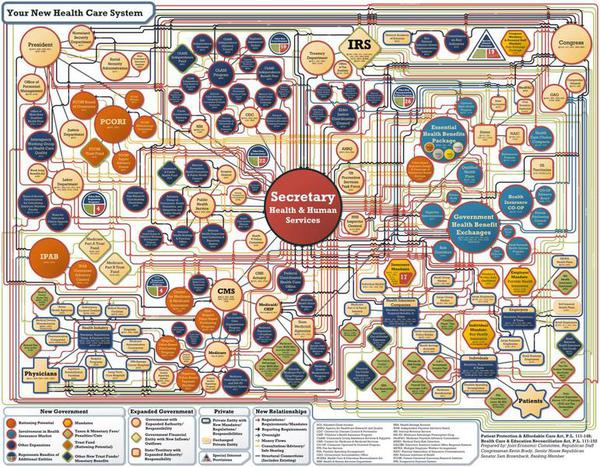Should Government Ration Health Care? It’s Coming
Ironically, the same people responsible for funding bridges to nowhere and all manner of wasteful programs and policies will be the same ones deciding whether or not your life-saving cancer medicine is helpful to the bottom line.
By Ken Connor
This year the U.S. is expected to spend $2.8 trillion on health care. The tab  for Medicare alone will likely cost taxpayers $590 billion, with 25% of that sum going for patients in their last year of life. Given the anemic state of our economy and the huge strain on our medical resources, should government step in and decide how care is to be allocated among the sick and dying? Should Big Brother determine whose life is worth saving and whose is not by rationing health care? That’s the topic being addressed this week in a debate hosted by Intelligence Squared U.S. as part of the Second Annual Chicago Ideas Week (CIW). According to CIW’s website, the aim of the event is to share ideas, inspire action, and ignite “change to positively impact our world.”
for Medicare alone will likely cost taxpayers $590 billion, with 25% of that sum going for patients in their last year of life. Given the anemic state of our economy and the huge strain on our medical resources, should government step in and decide how care is to be allocated among the sick and dying? Should Big Brother determine whose life is worth saving and whose is not by rationing health care? That’s the topic being addressed this week in a debate hosted by Intelligence Squared U.S. as part of the Second Annual Chicago Ideas Week (CIW). According to CIW’s website, the aim of the event is to share ideas, inspire action, and ignite “change to positively impact our world.”
Fostering thoughtful discussion across a broad spectrum of issues is a good idea, but putting government in charge of rationing healthcare at the end of life is not. Proponents of the proposition that Big Brother knows best are Peter Singer, Ira W. DeCamp Professor of Bioethics at Princeton University, and Dr. Art Kellerman, Chair in Policy Analysis at Rand Health. The proposition is opposed by Sally Pipes, President and CEO of the Pacific Research Institute, and yours truly.
My debate partner and I shall maintain that Americans do not want bureaucratic bean counters determining what care they will receive at the end of their lives, that health care should be tailored to a particular patient’s needs and condition. When it comes to the practice of medicine, one size definitely does not fit all. There simply is no way that a government functionary practicing “cookbook” medicine in Washington, D.C., can take into account all the nuances and particularities of a terminally ill or mortally injured person in a hospital bed 3000 miles away. Decisions about the nature and extent of such care ought to be made at the bedside by physicians and their patients and/or the patients’ families.
The consequence of putting green-visored G-men in charge of our health care decisions is that the primary driver of these decisions will be based on “comparative effectiveness” models and “cost-benefit” analyses. Ironically, the same people responsible for funding bridges to nowhere and all manner of wasteful programs and policies will be the same ones deciding whether or not your life-saving cancer medicine is helpful to the bottom line. Can’t you hear it now? “Ralph, you’ve gotta squeeze another ten billion dollars out of the end-of-life cohort. Solyndra has gone under and POTUS wants to prop up Green Energy. Even though it’s a long shot, he says there’s more potential for a return on investment in wind and solar than there is with the sick and dying.”
No one is suggesting that we shouldn’t be good stewards of scarce healthcare resources and that the care delivered at the end of life shouldn’t be reasonable and necessary. But aren’t treating physicians and hospital utilization committees and people with their feet on the ground in the community in a better position to make these assessments than Washington bureaucrats who have no personal knowledge of the situation? What criteria will the all-wise bureaucrats use to pick winners and losers at the end of life? Will they be any more successful than they were in picking Solyndra and Abound Solar? But then again, what will it matter? At the end of life, we’re all losers, right! The only sure things in life are death and taxes, after all. Nobody gets out of here alive.
And Heaven forbid a guy like the erstwhile Dr. Singer gets picked to be the Rationer-in-Chief in the next Administration. This is the guy that advocates infanticide for disabled infants, maintaining that they are not really “persons” since they lack the capacity for rationality, self-consciousness, communication and other qualities he deems “morally significant.” This same ghoulish logic applies with equal vigor to handicapped adults and to the elderly with dementia. According to Singer, being born into the human family does not automatically make you a “person,” being a member of the species Homo sapiens is not enough to confer a “right of life” on a hairless bi-ped, and the notion that human beings have been endowed by their Creator with an unalienable right to life is an antiquated sentiment subscribed to only by lunatics on the Religious Right.
Mr. Singer’s philosophy of bioethics reveals that our enlightened secular age is one in which the sanctity of life ethic enshrined in our Declaration of Independence is being transcended by a quality of life ethic. And as far as Uncle Sam is concerned, money is tight and there are other places where it can be better spent, like bailouts for AIG, or Fannie and Freddie, or the Muslim Brotherhood.
The debate takes place Wednesday, October 10, 2012 in Chicago and will air shortly thereafter on a number of public television stations and on more than 220 National Public Radio stations. Details can be found by clicking here.
Tune in, and watch the sparks fly.
Ken Connor is an attorney and co-author of “Sinful Silence: When Christians Neglect Their Civic Duty” He is also Chairman of the Center for a Just Society.
Previously at usACTIONnews:
Dr. Sums Up Obamacare in a Sentence:


Help Make A Difference By Sharing These Articles On Facebook, Twitter And Elsewhere:
